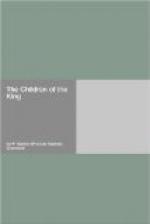The little room was very dark. A single wick burned in the boat-shaped cup of the tall earthenware lamp, and there was little oil left in the small receptacle. On the high trestle bed, upon the thinnest of straw mattresses, decently covered with a coarse brown blanket, lay a pale woman, emaciated to a degree hardly credible. A clean white handkerchief was bound round her brow and covered her head, only a scanty lock or two of fair hair escaping at the side of her face. The features were calm and resigned, but when the pain of the death agony seized upon her the thin lips parted and deep lines of suffering appeared about the mouth; She seemed to struggle as best she could, but the low, quavering cry would not be stifled—lower and more trembling each time it was renewed.
An old barefooted friar with a kindly eye and a flowing grey beard stood beside her. He had done what he could to comfort her and was going away. But she feebly begged him to stay a little longer. In an interval, while she had no pain, she spoke to her boys.
“Ruggiero—Sebastiano—dear sons—you could not save me, and I am going. God bless you. Our Lady help you—remember—you are Children of the King—remember—ah.”
She sighed heavily and her jaw fell as another sort of pallor spread suddenly over her face. Poor Carmela was dead at last, after weeks of sickness, worked to death, as the neighbours said, by Pietro Casale and his wife Concetta.
She left those two boys, lean, poorly clad lads of ten and twelve years, yellow haired and blue eyed, with big bones and hunger-pinched faces. They could just remember seeing their father brought home dead with a knife wound in his breast six years earlier. Now they took hands as they looked at their dead mother with a sort of wondering gaze. There were no tears, no cries of despair—least of all did they show any fear.
Old Padre Michele made them kneel down, still hand in hand, while he recited prayers for the dead. The boys knew some of the responses, learned by ear with small regard for Latinity, though they understood what they were saying. When the monk got up they rose also and looked again at the poor dead face.
“You have no relations, my children,” said the old man.
“We are alone,” answered the elder boy in a quiet, clear voice. “But I will take care of Sebastiano.”
“And I will help Ruggiero,” said the younger in much the same tone.
“You are hungry?”
“Always,” answered both together, without hesitation.
Padre Michele would have smiled, but the hungry faces and the mournful tone told him how true the spoken word must be. He fumbled in the pockets in the breast of his gown, and presently produced a few shady-looking red and white sugar sweetmeats, bullet-like in shape and hardness.
“It is all I have now, my children,” said the old man. “I picked them up yesterday at a wedding, to give them to a poor little girl who was ill. But she was dead when I got there, so you may have them.”




